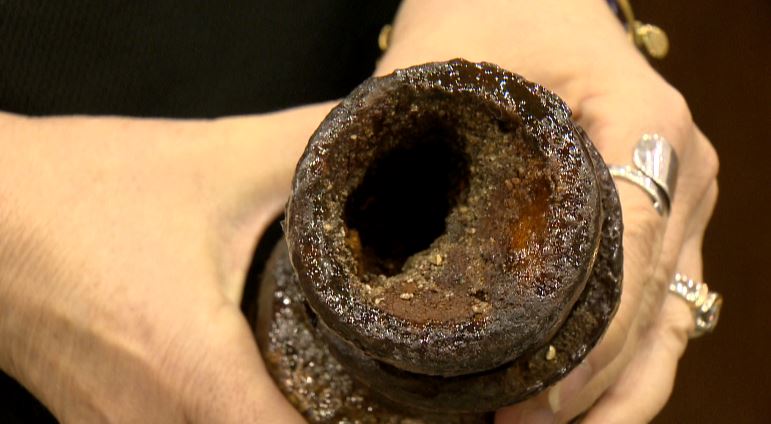Halifax Water’s landmark proposal to replace lead pipes on private property — free of charge — is facing its first round of deliberation this week at the Nova Scotia Utility and Review Board (NSUARB).

Board members at Halifax Water pushed forward the $14-million plan last year after an investigation led by Global News and the Star Halifax published a disturbing history of failed lead tests from Halifax Water, due to lingering lead service lines in aging public and residential infrastructure.
That same series of stories, cited by the utility as a catalyst for its proposal, also revealed nearly a quarter of a million homes on private wells in the province are at risk of lead contamination.
The NSURB scheduled hearings to review the proposal between June 1 and June 5.
READ MORE: Citing Tainted Water investigation, Halifax Water advances offer to replace lead pipes for free
Last November, the board members from Halifax Water unanimously approved a suggestion to try and complete lead service line (LSL) replacement on homes within its boundaries by “2039 or sooner” due to the serious public health risk tied to lead exposure.
That target has now been moved up to 2038, Halifax Water general manager Cathie O’Toole told the NSURB on Monday.
“We’ll accomplish as much as we can in conjunction with the HRM projects,” she said, referring to the Halifax Regional Municipality’s paving projects.
“There may very well be streets where we have to go on our own because there will be no municipal projects.”

Lead is a neurotoxin associated with increased incidence of high blood pressure, renal dysfunction, decreased cognitive performance and other complications. It’s particularly dangerous for children, linked to ADHD, lowered IQ and developmental disorders.

Get weekly health news
It can leach into tap water from a variety of sources, including the underground lead pipes that link homes to city water mains or wells, or from lead solder or some plumbing fixtures that contain traces of it inside homes.
Co-ordinating efforts to replace lead service lines (LSL) with municipal paving projects would save an estimated 30 per of costs, according to the utility, and minimize construction disruption to neighbourhoods.
READ MORE: Thousands of Nova Scotians at risk of lead exposure from wells
If approved, however, Halifax Water would try to prioritize homes with “sensitive populations,” including children, seniors and expectant mothers.
“It is our intent to make funding at 100 per cent in other situations besides the integration with HRM projects,” said O’Toole.
That criteria is still “under development,” she added, and in the interim, anyone who wants to replace their own lead pipes will continue to be eligible for the utility’s existing rebate program, covering 25 per cent of the costs.

In October, a national investigation called ‘Tainted Water’ revealed hundreds of thousands of Canadians have been unwittingly exposed to lead in their drinking water — many in dangerous concentrations exceeding Health Canada’s guideline.
The project was a collaboration between Global News, the Star Halifax, Concordia University’s Institute for Investigative Journalism, reporting students at the University of King’s College and other media and academic partners nationwide.
Halifax Water credited that reporting directly in its proposal to replace lead pipes for free. In a report, it said the series prompted a 241-per cent spike in web traffic associated with lead within a week of publication, and customer requests for information between 25 and 50 times higher than normal.
READ MORE: Tainted water in Nova Scotia — How do I get the lead out?
Replacing LSLs for free in Halifax requires a change in regulation that, if approved, is expected to increase the water rates for consumers in the short-term. It would, however, “remove remaining barriers to private LSL replacement,” reads a February 2020 application to the NSURB.
The cost of replacing one’s own lead pipes — up to $10,000 before the rebate — has been cited by customers as an obstacle in ridding homes of the dangerous service lines.
READ MORE: Lead in Nova Scotia — schools a patchwork of data unavailable to parents, teachers
The free-of-charge replacement is considered an “enhancement” to that program, which also includes free lead sampling for homeowners considered to be at risk.
The review board’s outside legal counsel, Bruce Outhouse, noted Monday that “it doesn’t appear there’s any opposition to this” from any of the board’s consultants, but he challenged Halifax Water on the timing of LSL replacement given that lead “isn’t good for anybody.”
“If you’re waiting for street renewal, you could be there literally forever,” he said.
In addition to prioritizing sensitive populations, O’Toole responded, “if there is no lead service line replacement coming in the near future for them, we do offer monitoring and we do continue to provide filters for those households.”
READ MORE: Mayor wants to get rid of lead pipes in Regina by 2025
There are roughly 3,500 private and 2,500 public lead service lines to replace at a total cost of $38.5 million. Halifax Water estimates the enhanced program will result in complete lead pipe replacement 24 years earlier than if it had continued the current rebate regime.
The proposed start date is Jan. 1, 2021, pending NSURB approval, a decision that could take several months.

The utility’s proposal follows other announcements in Quebec and Saskatchewan to improve and expand testing, along with other incentives such as free filters or rebates for affected households — proposals that were also triggered by reporting by Global News and its partners.
More to come.









Comments
Want to discuss? Please read our Commenting Policy first.